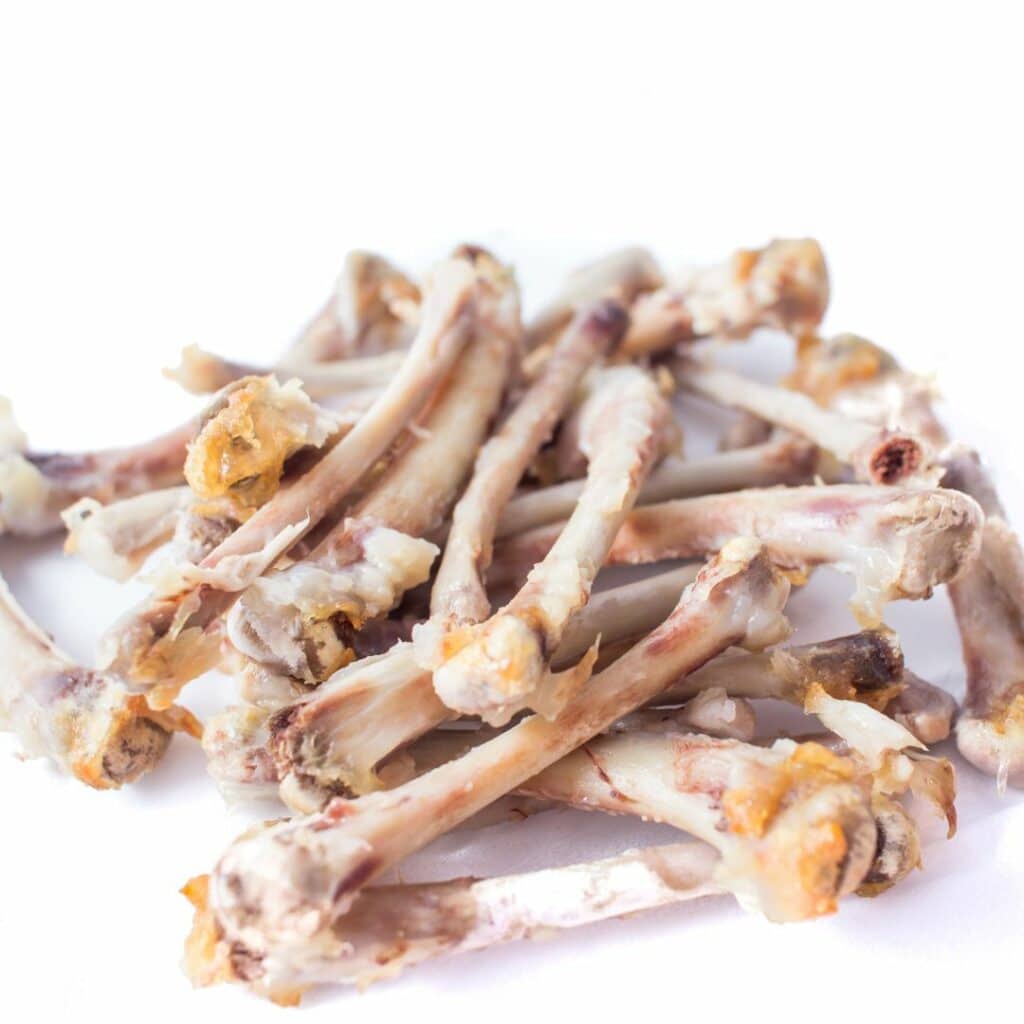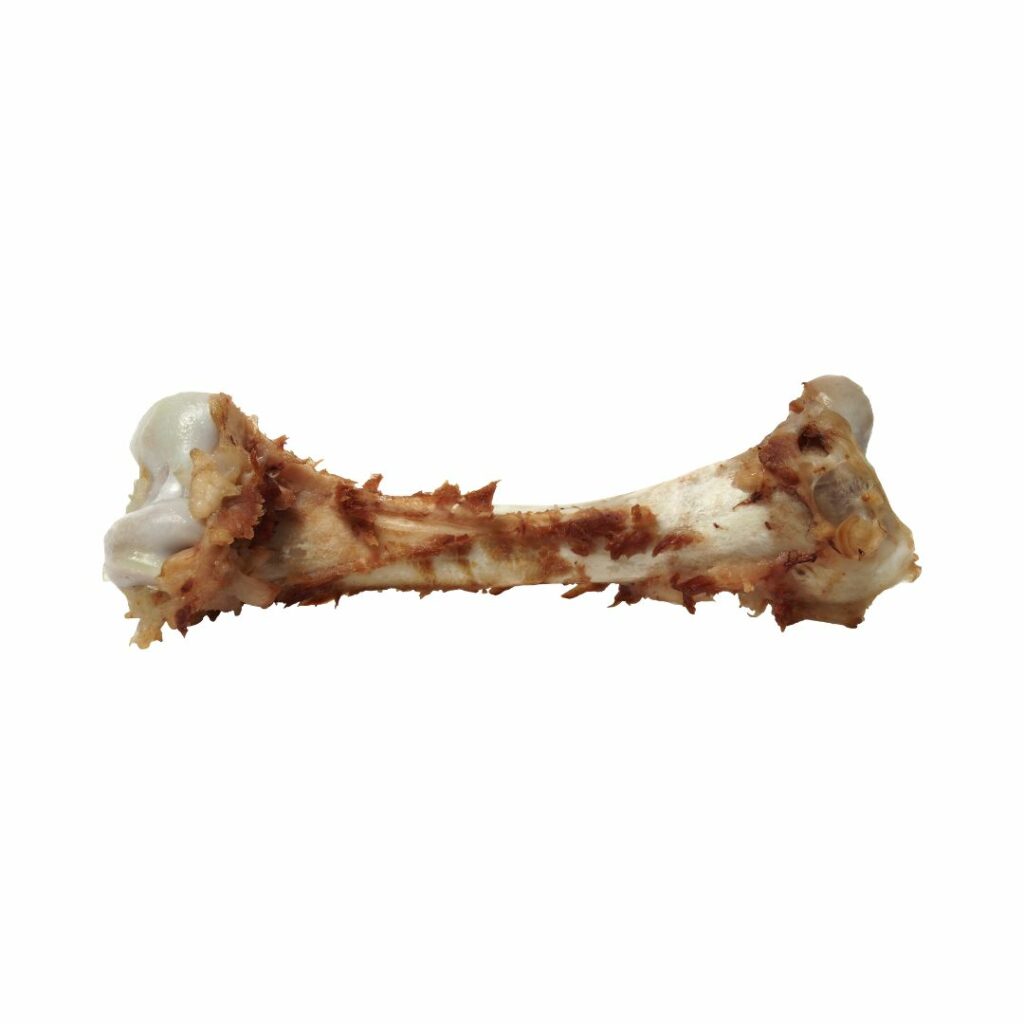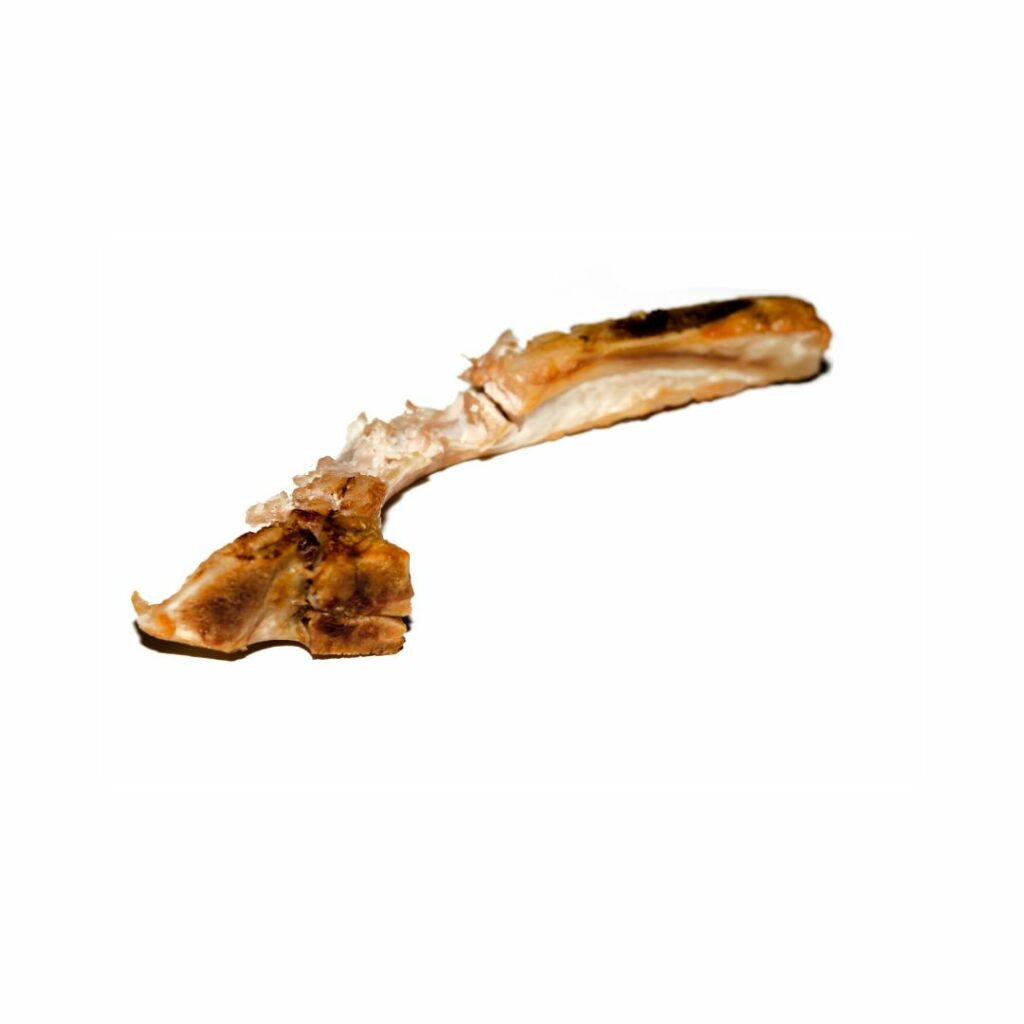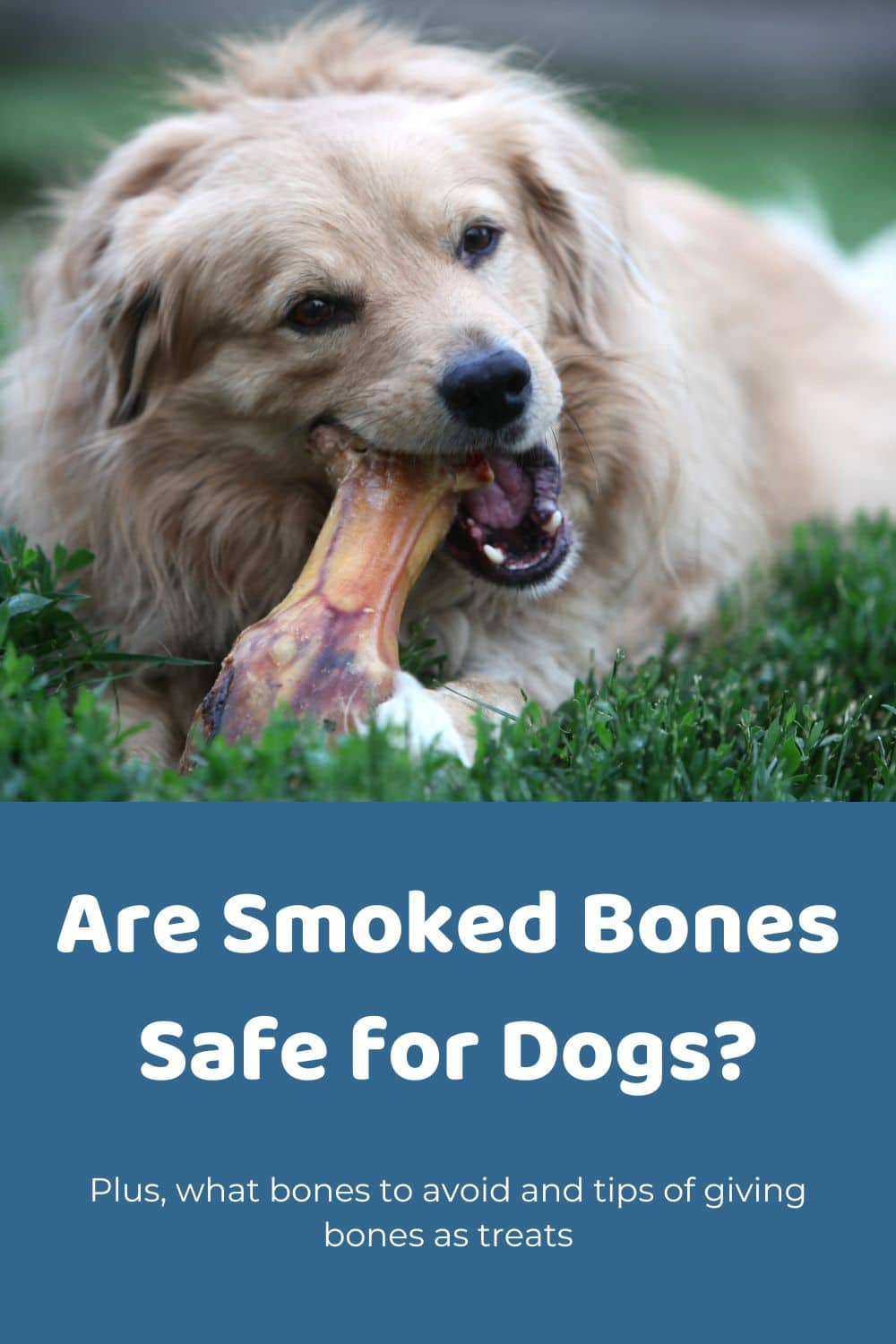While we’re sure your pup is more than happy to receive any kind of treat they’re offered, it can be tough to know whether all snacks, even ones specifically made for dogs, are good for them. While issues of obesity top the list, there are other things to think about, such as dietary sensitivities and issues with how certain chews break down. Here we’ll take a further look at bones as a treat for your pup in general and the latest popular version of these snacks – smoked bones for dogs – in particular, explaining the various do and don’ts as we go.
Table of Contents
- Why Give Bones as A Treat?
- Bones To Avoid Giving Your Dogs
- Top Tips For Giving Bones As Treats
- Frequently Asked Questions About Bones For Dogs
- Smoked Bones: Final Thoughts
Why Give Bones as A Treat?
As a dog owner, you likely know by now the value of having a variety of treats to hand. They aid in everything from training to keeping your pup occupied and out of trouble when you are too busy to play. Beyond that, they offer up a plethora of benefits for your mutt’s dental health. Chewing is great for removing tooth tartar buildup, reducing the risk of gum disease, and stimulating saliva production for an all-around healthier mouth. Finally, this kind of jaw action is cathartic and so can help calm anxious dogs, too.
You may have heard on the grapevine that certain kinds of bones can pose health risks for dogs. That is certainly the case. While the issue here is unlikely to be obesity or food intolerances, after all, doggy ancestors have been chowing down on them for generations; problems can arise with the texture of the bone due to its preparation.
Bones are particularly popular among pup owners because they are viewed as being an all-natural snack that contain nutrients that dogs need, such as calcium and phosphorus. They blow synthetic chews out of the water in terms of keeping your pal interested, and they do tend to be both healthier and far longer-lasting than many of the manufactured kinds. So, if your fur baby is the type to decimate even the hardiest of canine treats in mere seconds, bones are a happy (and generally reasonably priced) alternative option.
Bones To Avoid Giving Your Dogs
When it comes to the question of bones for dogs, many vets position themselves firmly on the fence. The reason for this is that there are many ways this could go wrong. For every advantage bones offer, there are a whole host of potential problems to go alongside it. However, the same could be said for any other kind of canine chew, not to mention all the things your pup chooses to munch on that you would rather they didn’t – chair legs, shoes, pebbles on the beach…
A big, juicy bone is a good way to keep your hound from resorting to the worst of these, but a little knowledge is needed. The type of bone (which animal it came from), the size of the bone, and how the bone had been prepared can all have ramifications for how well it will be suited for your pet.
Small Bones
Smaller may seem like the safest choice in that your pup will find these bones easier to chew. However, the smaller the bone in relation to your dog’s mouth, the greater the risk of it becoming stuck either in their throat or further down their digestive tract. While this may simply result in a little discomfort and a bit of coughing, it could also lead to vomiting or, at the more severe end of the spectrum, they could need surgery to have it removed.
Cooked Bones
Cooked bones, even ones on the larger side, are another big no-no. Not only does cooking the bone removes all the beneficial nutrients that are one of the biggest reasons for offering them up in the first place, but subjecting any kind of bone to heat makes it brittle. When these bones break down, they splinter into vicious-looking shards that are sharp, nasty, and can cause some serious damage to your Doods innards.
Chicken Bones
Chicken bones combine the very worst of the above two points. Not only do they tend to be on the small side – far too small for any of the bigger Doodles anyhow, but even in their uncooked state, these bones are weaker and far more brittle than other bone types. And while chicken bones are small enough for most dogs to easily swallow whole, they are, unfortunately, large enough to get stuck in the intestines causing impaction or worse.

Turkey Bones
Much like chicken, and all poultry bones for that matter, turkey bones are likewise brittle enough to break into sharp harmful pieces when chewed and small enough to cause blockages and other issues in the digestive system if swallowed. So, for all the reasons that you would hold off giving your pup chicken bones, either raw or cooked, the same applies to turkey ones too.

Pork Bones
As pork bones are generally a fair bit larger than either chicken or turkey ones, it would be a fair assumption that they would be okay for dogs if offered up raw. Actually, this is not the case. Larger dogs might still attempt to swallow one of these bones, which could cause choking or blockages. Plus, pork bones are also very prone to splintering and breaking into chunks large enough to cause issues when your pup gulps them down.

Top Tips For Giving Bones As Treats
So, if you are looking to give your dog a bone for a treat, opt for one from a larger animal such as sheep, cow, or bison. These are often available to buy for your dog online. But even then, be sure to:
Tip 1) Offer Raw/Smoked Bones
While there are various bone types for dogs, smoked ones remain among the most popular for pet parents as they eliminate some of the risks from raw, unprocessed bones. Smoking is a method of preparation used to give a unique flavor to meat. There are two methods of doing this: either through hot smoking, which cooks the meat on the bone and the bone too, making it unsuitable for pups or by cold smoking, which doesn’t and is the, by far, the best prep method for dog bones.
Tip 2) Take Away The Bone After 10-15 Minutes
To stop your pet from devouring the bone, it’s a good idea to give them this treat only once they have been fed. The edge will be gone from their hunger, and they can simply focus on enjoying the chewing. Even so, it’s a good idea to give them the bone for short periods of time. This way, you can check to see whether there are any signs of splintering or cracks or if the edges have become roughened and may damage the softer parts of your fur baby’s mouth. Obviously, they won’t be happy about it, but it will keep them safe.
Tip 3) Discard Bones After 3-4 Days
While the benefit of a bone is how long it can last, you want to be careful about keeping it around for too long. Even if the bones seems sound enough, constant chewing, coupled with your canine’s saliva, will no doubt have the effect of weakening it. This increases the risk of the bone suddenly snapping. In addition, the bone could spoil – meaning that bacteria grows on its surface (it is a type of food, after all, and one that gets dragged about a fair bit). Ingesting the resultant bacteria could make your pup sick.
Tip 4) Give Large Bones to Large Breed Dogs
It goes without saying, really, that bigger dogs will need bigger bones. This is not just because they might attempt to swallow anything they consider small enough and it could get stuck, but because their larger, stronger teeth will make fast work of anything too small for them. A good rule of thumb is to stick to bones that are longer than the length of your hound’s muzzle. Anything too much bigger, though, might cause them to lose interest. Make sure to throw the bone out when it gets small enough to become a hazard.
Tip 5) Be Attentive
You’ve ticked all the right boxes according to the tips provided above – that’s good, but you are still going to need to supervise your pooch with their new bone. This isn’t a treat to give your dog when you are going to be away from the house. You never quite know how the bone will break down or whether your pup will try to swallow it or the chunks that fall from it, whole with disastrous consequences. It’s much better to keep a careful eye out for your dog to ensure that they are happy with simply chewing the bone.
Frequently Asked Questions About Bones For Dogs
Cold-smoked bones are one of the better preparation methods for a bone you are going to give your dog. Cooking them will make them too fragile for chewing, and raw bones could make your pup sick if they haven’t been well handled. Just make sure to check the bone thoroughly for signs of weakening before giving it to your pup and discard it after four days tops.
Smaller, more brittle bones such as those of poultry, as well as any kind of cooked bones, are never a good treat idea for your hound. These bones can prove to be choking hazards or can break down into sharp splinters that could become stuck in various parts of their digestive system. Any bone you give your dog should be larger than their mouth and either raw or smoked – these are the safest kinds of bones for dogs.
Rib bones, no matter how they are prepared, should be absolutely off-limits to your dog. Most kinds of pork bones are simply too brittle to be any good for dogs, even in their uncooked state. You certainly should not be feeding your pup rib bone scraps from the table. Not only is this potentially harmful to their health, but it sets a bad precedent for future mealtimes with your dog.
As above, any bones that come from pork are generally not a good idea for your pooch. Although some people find that pigs’ ears make an excellent chewing alternative to bones. You’ll be able to find these online to buy for your dog. Most of the bones, though, will be from larger animals, primarily cows. These are not only large enough not to be swallowed but durable enough to withstand pretty heavy-duty chewing action.
Smoked Bones: Final Thoughts
You may be looking for a chewable alternative to various toys or manufactured treats if your dog is managing to tear through them in no time. On the other hand, you may simply wish to offer your pet a treat you know they will truly enjoy chowing down on. The great thing about bones is they are already likely to be a canine firm favorite even with the absolute pickiest of pooches. Beyond that, they offer significant benefits in terms of boosting jaw and dental health and providing some extra nutrients advantageous to pups.
The right bones, given in the right way, is an excellent idea for any dog. You just need to make sure you keep a close eye on them when they have it. The best way to know that the bone is going to be okay for your pal is to buy one specially designed for dogs. The good news is that there are plenty of budget-friendly options available both online and probably down at your nearest pet store too.
Learn How to Care for Your Doodle Puppy!

Perfect for first-time Doodle parents, get ALL your questions answered, including questions new Doodle parents don’t even think to ask.
Plus, get $700 worth of Bonus Materials for FREE, including:- Doodle Parenthood Community and Support Group ($190 value)
- Doodle Puppy Growth Tracker ($20 value)
- EMERGENCY Cheatsheet: When To Call The Vet Immediately ($50 value)
- HELP! Button ($145 value)
- And SO MUCH MORE!

